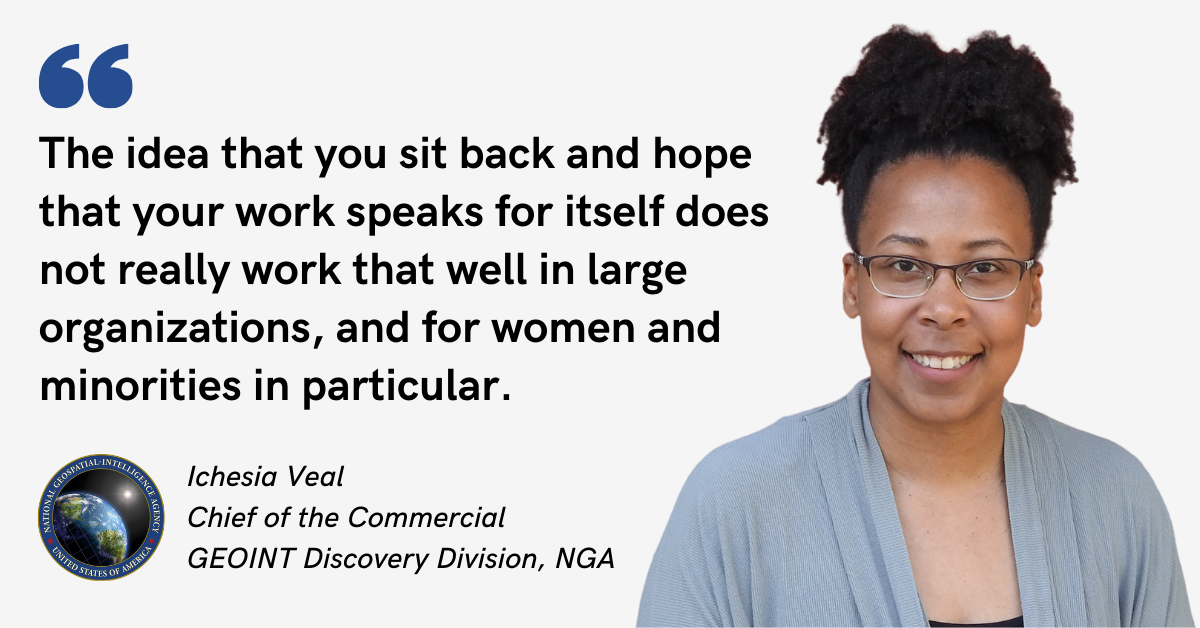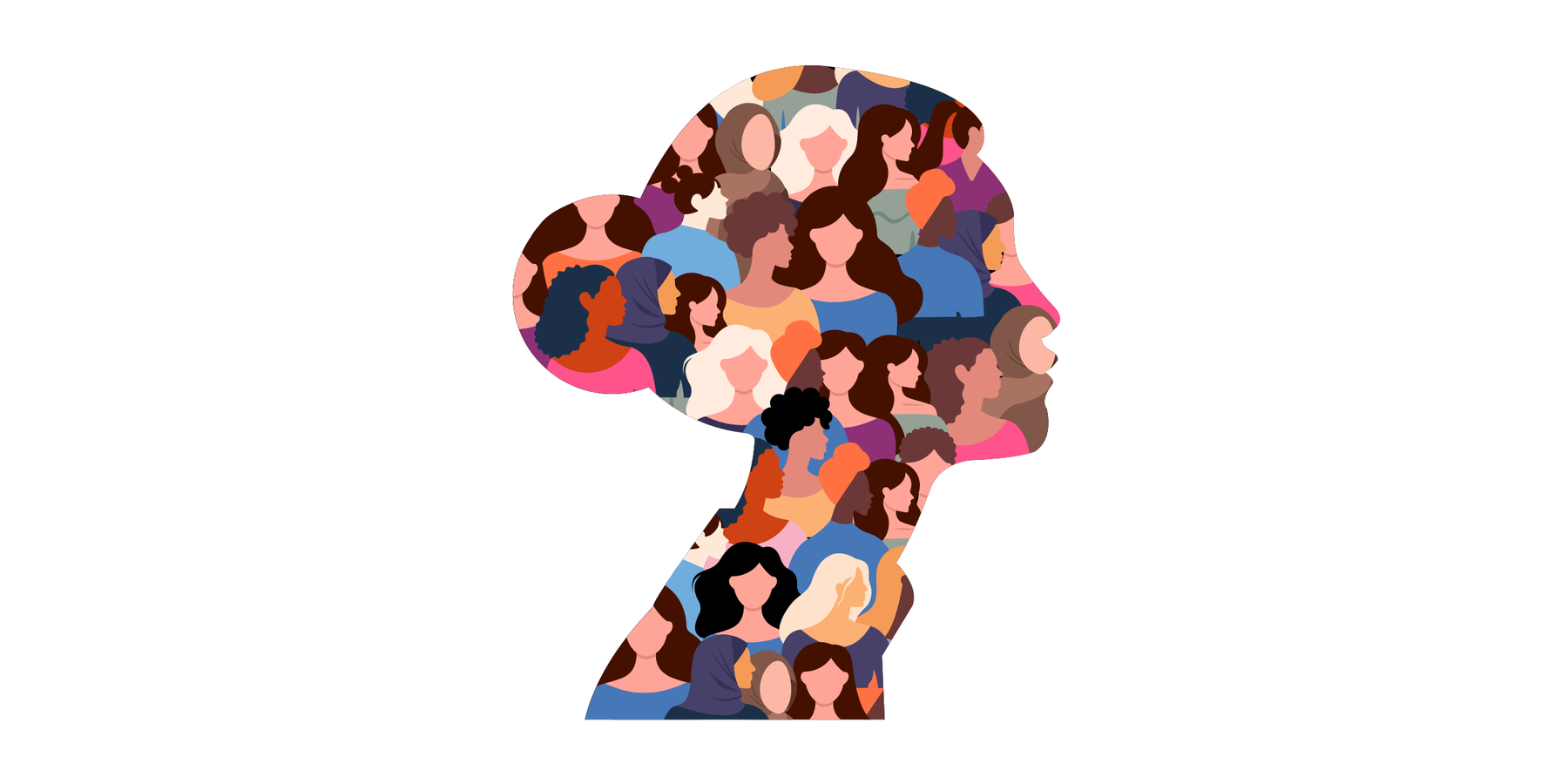First, she didn't know what NGA was. If you don't either, here's a primer: the National Geospatial-Intelligence Agency provides world-class geospatial intelligence to policymakers, warfighters, intelligence professionals and first responders. Its work is used in disaster response, wars, and cellphone navigation, among other things.
Second, Ichesia didn't plan on studying anything STEM related when she began her undergraduate degree. She thought she'd pick a liberal arts major until the university reached out and told her they'd give her a scholarship if she studied physics. Although Ichesia liked science and math classes in high school, did very well in them, and was even encouraged by teachers to pursue that kind of major, she didn't think it was for her.
"I didn't know anyone that had focused on STEM. I definitely didn't know any women who had pursued that path. And so it wasn't something that I ever seriously considered," says Ichesia. "It just never dawned on me, and part of that is representation. It's what you see around you, what fields you know about, what jobs you know about," she says.
Being at the historically black college and university NSU helped change the representation she was exposed to. Half of the students in her physics classes were women.
"It was a confidence boost, being in an environment where you're able to see people that look like you. I was able to focus more on physics," Ichesia says.
Surrounded by smart, determined Black men and women, Ichesia leaned into learning and signed up to do a master's in material science at NSU after finishing her undergraduate degree.
Now, decades into a career, including 10 years at NGA, that has often seen her as the only woman, the only Black person, and almost always the only Black woman in the room, Ichesia has become an example of representation in the male-dominated field of technical intelligence and imagery science.
After just a few months in her biggest leadership challenge yet — running NGA's division in charge of learning about commercial geospatial technologies and innovations with a team of 23 reporting to her — we sat down with her to reflect on her professional path and how she's grown to be her own best advocate.
Measuring opportunities in terms of impact
When Ichesia started at NGA as an imagery scientist, she leaned on her physics and materials science background. "Understanding how materials in the environment interact with different things really translates into imagery science," she says. She did that for years and enjoyed it, but came to realize that she wanted to be able to make a bigger impact.
"I'd get a question from a policymaker that I couldn't answer, not because there wasn't an answer, but because we just didn't have access to the technology for whatever reason. It started to become a little frustrating, and I started thinking about the impact I could have if I was willing to step away from doing the science to advocating for the technology and the capabilities," remembers Ichesia.
She didn't set off to become a supervisor or a manager. Instead of thinking about a specific position she wanted, she focused on the value she could bring to the agency and to her team. By prioritizing value and impact, she found herself taking on jobs that didn't even exist beforehand, and she encourages other women to do the same.
"I've been the first person in a position because it was brand new. If I waited for a path, or the idea that you have to know exactly where you're going every minute, then I wouldn't have taken those positions and I probably wouldn't be where I am right now," she says.
Ichesia's strategy for planning her professional decisions involves evaluating opportunities by assessing the likelihood of three things: being successful, making an impact, and both growing and learning new things.
She suggests that women looking for their next opportunity ask themselves the following questions:
- What am I good at?
- What am I not quite as good at, but need and want to get better at?
- Where can I add some value?
Above all, Ichesia encourages women to start asking those questions early. She recommends, "not waiting until a job has gotten stale or hoping that someone notices that you might be right for the next position, but instead actually going and trying to get that position."
One way to do this at NGA, Ichesia explains, is to take advantage of the learning opportunities that are available, such as classes and conferences.
"At NGA, you're actually evaluated on your ability to develop your career and think about how to become better at what you do. I always tell my employees that it's not just about the job you're currently in. It's also about the things you want to do for the agency moving forward."
How she deals with being an "only"
"With almost every position I've ever had in any job I've had, I was either the only woman, the only Black person, or the only Black woman," says Ichesia. "I can probably more easily count the amount of times I was not in that situation than [the times] I was in that situation."
Being an "only" was hard, particularly in terms of networking within her field, she says.
"I didn't know how to navigate those kinds of activities. I felt like I was kind of standing on the outside watching it happen," says Ichesia of her first few years on the job.
She identified networking as one of the things she wanted to get better at; enlisted some help, including her husband and a male mentor, who coached her; and found a way to make it work for her.
"I learned how to get myself into that conversation and not allow myself to be an observer of it," she says.
Now, as a division leader and a conduit for connecting the organization's leadership and her workforce, Ichesia is paying it forward and actively seeking to include others.
"I'm not generally a person that likes to put themselves on the forefront, but I really do enjoy being an advocate, especially for women's issues and minority issues," she says.
Advocating for herself — with help
One of the most important things Ichesia has learned in managing her career is how to be her own best advocate.
"I am now willing to talk about my accomplishments. There's no effort to play them down. And if someone gives me a compliment about the work I've done, I own up to it," she says. "The idea that you sit back and hope that your work speaks for itself does not really work that well in large organizations, and for women and minorities in particular."
That has meant that Ichesia has learned to move beyond her introversion and be confident about her work.
"Speaking up and saying, 'Yes, I worked hard on that, and that's the kind of effort I bring to most of the things I do' is one way to advocate for your own career," she says.
She didn't learn how to do this alone. A year or so ago, when Ichesia was up for the big promotion into her current role, she found herself stuck in a competitive and challenging process and wondering if she deserved the promotion. A friend of Ichesia talked it through with her and walked her through all she'd done to deserve it. A grateful Ichesia named that friend her "confidence champion."
"The further you progress, the more competitive things may become, and when you're having those moments of self-doubt of whether or not you really can do something or whether you really deserve that promotion or award, [a confidence champion] can help you take that step back and say 'of course you do,'" says Ichesia, who's now appointed herself as a confidence champion for her friend, too.
Having that peer support is key, but so are mentors, says Ichesia, who didn't have any early on in her career, but counts several as her key advisors now.
"I learned that you can have mentors for different needs and purposes," she says, highlighting that she has one mentor that provides technical guidance and another she goes to for politically-savvy advice.
As Ichesia continues to grow her career, she's looking forward to continuing to be a mentor and confidence champion for others, including the "passionate civil servants" she works with.
"The people who work at NGA care about this country. They care about our mission, and they want to do a good job," she says. "We're all in it to do the best we can, together, for our country."
If you're interested in learning more about NGA, you can sign up to follow their job postings here or reach out to Ichesia in the comments below!
Approved for public release, 20-588




